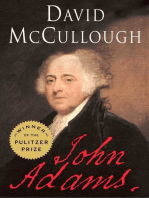0 ratings0% found this document useful (0 votes)
31 viewsSSSG INGLESE Adverbs of Manner
SSSG INGLESE Adverbs of Manner
Uploaded by
Βασιλεία ΕυαγγέλουThe document contains exercises on adverbs of manner in Italian. There are multiple choice questions, fill in the blank exercises, translations, and transformations of adjectives to adverbs. The exercises cover a variety of common adverbs of manner.
Copyright:
© All Rights Reserved
Available Formats
Download as PDF, TXT or read online from Scribd
SSSG INGLESE Adverbs of Manner
SSSG INGLESE Adverbs of Manner
Uploaded by
Βασιλεία Ευαγγέλου0 ratings0% found this document useful (0 votes)
31 views1 pageThe document contains exercises on adverbs of manner in Italian. There are multiple choice questions, fill in the blank exercises, translations, and transformations of adjectives to adverbs. The exercises cover a variety of common adverbs of manner.
Original Title
SSSG INGLESE Adverbs of manner
Copyright
© © All Rights Reserved
Available Formats
PDF, TXT or read online from Scribd
Share this document
Did you find this document useful?
Is this content inappropriate?
The document contains exercises on adverbs of manner in Italian. There are multiple choice questions, fill in the blank exercises, translations, and transformations of adjectives to adverbs. The exercises cover a variety of common adverbs of manner.
Copyright:
© All Rights Reserved
Available Formats
Download as PDF, TXT or read online from Scribd
Download as pdf or txt
0 ratings0% found this document useful (0 votes)
31 views1 pageSSSG INGLESE Adverbs of Manner
SSSG INGLESE Adverbs of Manner
Uploaded by
Βασιλεία ΕυαγγέλουThe document contains exercises on adverbs of manner in Italian. There are multiple choice questions, fill in the blank exercises, translations, and transformations of adjectives to adverbs. The exercises cover a variety of common adverbs of manner.
Copyright:
© All Rights Reserved
Available Formats
Download as PDF, TXT or read online from Scribd
Download as pdf or txt
You are on page 1of 1
esercizi di recUPerO
Adverbs of manners Name
Surname
________________________
____________________
Class _________________________
Date _________________________
1 Trasforma gli aggettivi in avverbi di modo. 4 Sottolinea l’alternativa corretta.
1 bad ________________________ 1 Bob is always late / lately for school.
2 careful ________________________ 2 Can you speak slow / slowly, please?
3 complete ________________________ 3 Matthew is angry / angrily with you.
4 dramatic ________________________ 4 Sandra is a good / well swimmer.
5 easy ________________________ 5 My sister always studies very hard / hardly.
6 fast ________________________ 6 I can’t speak French very good / well.
7 good ________________________ 7 Our team lost the match: they played very
8 happy ________________________ bad / badly.
9 hard ________________________ 8 Pat is a careful / carefully driver.
10 immediate ________________________ 9 She spoke angry / angrily to me.
11 lazy ________________________ 10 The students finished the exercise quick / quickly.
12 loud ________________________
13 noisy ________________________ 5 Completa scegliendo un aggettivo o un avverbio.
14 quick ________________________
15 slow ________________________ bad / badly easy / easily sad / sadly good / well quick /
quickly generous / generously late / lately quiet / quietly
2 Leggi le frasi con attenzione e decidi se le parole careful / carefully comfortable / comfortably
sottolineate sono un aggettivo (adj) o un avverbio (adv).
1 Are you sitting ____________ ?
1 All the students got good marks in the test 2 Drive ____________: there’s ice on the road.
because it was very easy. ______ 3 That exam wasn’t very ____________ . Only three
2 Betty is a good tennis player. ______ students passed it.
3 We need to take an early train to be 4 Ann was very ____________ when she failed the
in Liverpool by nine o’clock. ______ exam.
4 Don’t drive so fast. We’re going to have 5 Jason always gets up ____________ on Sunday
an accident.•• ______ morning. He loves sleeping.
5 I don’t like getting up early in the morning. ______ 6 Lee is a fantastic footballer. He can play football
6 Jason can speak Chinese fluently. ______ really ____________ .
7 The exam was very hard.•• ______ 7 My grandparents are very ____________: they give a
8 Tim can play football really well. ______ lot of money to a lot of charities.
9 We arrived late because there was 8 Peter is a••very ____________ dancer: I don’t want
a lot of traffic. ______ to dance with him.
10 Your brother’s very friendly. ______ 9 The children are playing ____________ because the
baby is sleeping.
3 Completa con l’avverbio corrispondente all’aggettivo 10 Why are you walking so ____________: we aren’t
tra parentesi. late.
1 The baby is sleeping ____________ (peaceful). 6 TRANSLATION Traduci.
2 Did you study ____________ (hard) for your exam?••
3 This door closes ____________ (automatic). 1 Martin ha risposto alla domanda intelligentemente.
4 John waited for her ____________ (patient) for an 2 Bob guida sempre in modo pericoloso.
hour. 3 Martha ha aperto il mio regalo lentamente.
5 Why did he behave so ____________ (angry)? 4 Non camminare così velocemente: abbiamo tempo.
6 She started to cry ____________ (sudden). 5 La scorsa notte ho dormito molto male.
7 My sister can play the piano ____________ (beautiful). 6 Chiama i tuoi genitori immediatamente.
8 The dogs are playing ____________ (noisy) in the 7 Non riesco a capire l’insegnante: parla velocemente.
garden. 8 Frank sta facendo i compiti con molto attenzione.
9 Don’t speak ____________ (loud): granddad’s 9 Harry impara le lingue molto facilmente.
sleeping. 10 Perché Will ha risposto all’insegnante in modo così
10 The man ate the food ____________ (hungry). arrabbiato?
416 © 2012, Pearson Italia, Milano-Torino – photocopiable
You might also like
- The Subtle Art of Not Giving a F*ck: A Counterintuitive Approach to Living a Good LifeFrom EverandThe Subtle Art of Not Giving a F*ck: A Counterintuitive Approach to Living a Good LifeRating: 4 out of 5 stars4/5 (5943)
- The Gifts of Imperfection: Let Go of Who You Think You're Supposed to Be and Embrace Who You AreFrom EverandThe Gifts of Imperfection: Let Go of Who You Think You're Supposed to Be and Embrace Who You AreRating: 4 out of 5 stars4/5 (1108)
- Never Split the Difference: Negotiating As If Your Life Depended On ItFrom EverandNever Split the Difference: Negotiating As If Your Life Depended On ItRating: 4.5 out of 5 stars4.5/5 (887)
- Hidden Figures: The American Dream and the Untold Story of the Black Women Mathematicians Who Helped Win the Space RaceFrom EverandHidden Figures: The American Dream and the Untold Story of the Black Women Mathematicians Who Helped Win the Space RaceRating: 4 out of 5 stars4/5 (925)
- Grit: The Power of Passion and PerseveranceFrom EverandGrit: The Power of Passion and PerseveranceRating: 4 out of 5 stars4/5 (598)
- Shoe Dog: A Memoir by the Creator of NikeFrom EverandShoe Dog: A Memoir by the Creator of NikeRating: 4.5 out of 5 stars4.5/5 (545)
- The Hard Thing About Hard Things: Building a Business When There Are No Easy AnswersFrom EverandThe Hard Thing About Hard Things: Building a Business When There Are No Easy AnswersRating: 4.5 out of 5 stars4.5/5 (354)
- Elon Musk: Tesla, SpaceX, and the Quest for a Fantastic FutureFrom EverandElon Musk: Tesla, SpaceX, and the Quest for a Fantastic FutureRating: 4.5 out of 5 stars4.5/5 (476)
- Her Body and Other Parties: StoriesFrom EverandHer Body and Other Parties: StoriesRating: 4 out of 5 stars4/5 (831)
- The Emperor of All Maladies: A Biography of CancerFrom EverandThe Emperor of All Maladies: A Biography of CancerRating: 4.5 out of 5 stars4.5/5 (274)
- The World Is Flat 3.0: A Brief History of the Twenty-first CenturyFrom EverandThe World Is Flat 3.0: A Brief History of the Twenty-first CenturyRating: 3.5 out of 5 stars3.5/5 (2272)
- The Little Book of Hygge: Danish Secrets to Happy LivingFrom EverandThe Little Book of Hygge: Danish Secrets to Happy LivingRating: 3.5 out of 5 stars3.5/5 (419)
- The Yellow House: A Memoir (2019 National Book Award Winner)From EverandThe Yellow House: A Memoir (2019 National Book Award Winner)Rating: 4 out of 5 stars4/5 (99)
- Devil in the Grove: Thurgood Marshall, the Groveland Boys, and the Dawn of a New AmericaFrom EverandDevil in the Grove: Thurgood Marshall, the Groveland Boys, and the Dawn of a New AmericaRating: 4.5 out of 5 stars4.5/5 (270)
- The Sympathizer: A Novel (Pulitzer Prize for Fiction)From EverandThe Sympathizer: A Novel (Pulitzer Prize for Fiction)Rating: 4.5 out of 5 stars4.5/5 (122)
- Team of Rivals: The Political Genius of Abraham LincolnFrom EverandTeam of Rivals: The Political Genius of Abraham LincolnRating: 4.5 out of 5 stars4.5/5 (235)
- A Heartbreaking Work Of Staggering Genius: A Memoir Based on a True StoryFrom EverandA Heartbreaking Work Of Staggering Genius: A Memoir Based on a True StoryRating: 3.5 out of 5 stars3.5/5 (232)
- Cabin Crew InterviewDocument17 pagesCabin Crew InterviewΒασιλεία Ευαγγέλου100% (4)
- On Fire: The (Burning) Case for a Green New DealFrom EverandOn Fire: The (Burning) Case for a Green New DealRating: 4 out of 5 stars4/5 (75)
- 4ES1 02R Que 20200305Document12 pages4ES1 02R Que 20200305Βασιλεία Ευαγγέλου0% (1)
- The Unwinding: An Inner History of the New AmericaFrom EverandThe Unwinding: An Inner History of the New AmericaRating: 4 out of 5 stars4/5 (45)
- English For ProfessionalsDocument1 pageEnglish For ProfessionalsΒασιλεία Ευαγγέλου100% (1)
- Past Simple or ContinuousDocument4 pagesPast Simple or ContinuousΒασιλεία ΕυαγγέλουNo ratings yet
- English Foundation CourseDocument6 pagesEnglish Foundation CourseΒασιλεία ΕυαγγέλουNo ratings yet
- Writing Clinic Creative Writing Prompts 4 The Haun Fun Activities Games - 5426Document1 pageWriting Clinic Creative Writing Prompts 4 The Haun Fun Activities Games - 5426Βασιλεία ΕυαγγέλουNo ratings yet
- Interview QuestionsDocument9 pagesInterview QuestionsΒασιλεία ΕυαγγέλουNo ratings yet
- Right On! 4: - Quiz 3Document3 pagesRight On! 4: - Quiz 3Βασιλεία ΕυαγγέλουNo ratings yet
- Conversation TopicsDocument11 pagesConversation TopicsΒασιλεία ΕυαγγέλουNo ratings yet
- Cambridge Exams Group Registry FLYERSDocument1 pageCambridge Exams Group Registry FLYERSΒασιλεία ΕυαγγέλουNo ratings yet
- Conversation Topics For Business EnglishDocument8 pagesConversation Topics For Business EnglishΒασιλεία Ευαγγέλου100% (1)
- Be Amisarewaswere 87449Document1 pageBe Amisarewaswere 87449Βασιλεία ΕυαγγέλουNo ratings yet




















































